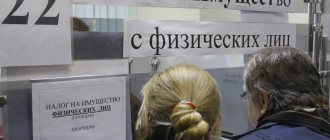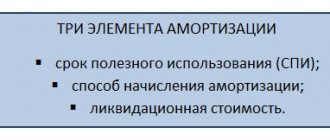- November 25, 2018
- Accounting
- Yulia Abdulbarova
Depreciation is one of the most popular accounting terms. But what exactly is it? In this article we will provide the answer to this question. We will also analyze which means are not subject to depreciation, and what, on the contrary, is depreciated. Let's talk a little about the useful life of property and look at how depreciation is calculated.
Concept
All material resources wear out over time. In practice, there are two types of wear:
- Physical. The product failed and began to work intermittently and with other breakdowns.
- Moral. The product, method, process, algorithm are outdated and do not meet modern requirements.
Therefore, it is fair that in accounting the initial cost of fixed assets, as well as any intangible assets as they wear out, is transferred in parts to the cost of products that are produced or provided by a company or enterprise.
It is this transfer process that is called depreciation. Moreover, in an accounting context, depreciation is the amount of amortized funds that have been accrued from the moment they were used.
What objects are not subject to depreciation? We will definitely look into this further.
What is depreciation? Clear and accounting-correct
We analyze seemingly understandable depreciation in the same way as they do in high-quality accounting courses and in universities.
Depreciation (Amortization) is the transfer of the value of fixed assets and intangible assets to the cost of products, works or services. Further, to save space, I will talk only about fixed assets, but everything that has been said also applies to intangible assets.
I'll introduce a couple more terms and then explain how it works.
1. Useful life (USL) - the period of time during which a fixed asset is capable of bringing economic benefits to the company.
2. Initial cost (OC) - the amount of costs for the acquisition of a fixed asset. This includes all costs that were incurred up to the moment of commissioning, including delivery, insurance in transit, customs clearance, unloading, commissioning. VAT and excise taxes are not included.
The meaning of depreciation is the monthly inclusion of part of the PS in the cost of production. This is necessary in order to receive enough cash as part of revenue to replace worn-out fixed assets with new ones. The price of the product must cover all costs of its production and sale. Including depreciation. Otherwise, sooner or later there will come a time when there will be nothing to produce. Many entrepreneurs throw depreciation out of management accounting. Do not do that.
Not counting depreciation as an expense is like living in a house made of cookies and slowly eating them.
Fixed assets are used to produce many units of output, so their cost is “spread out” into the cost of these units throughout the entire project. If you include PS in expenses immediately upon purchasing them, then the cost this month will jump up sharply. At the same time, the company will use the main tool for a long time.
Example 1.
The coffee shop purchased a coffee machine for 106 thousand rubles. Another 2 thousand rubles. paid for delivery. The total PS amounted to 108 thousand rubles.
Let's say 300 cups of coffee are sold per month. If you include PS as expenses immediately after purchasing a coffee machine, then for each cup you will have to pay 360 rubles. (108 thousand rubles / 300). This is not counting the cost of grains and other cost components. And all the next glasses will be free. The entrepreneur will first record a loss that does not exist, and then sell undervalued coffee. And he may make the wrong decision to sell them close to this “cost”, depriving himself of the opportunity to repay this loss.
Depreciation allows you to distribute the cost of assets over all products that will be produced using a fixed asset. The simplest method of depreciation is linear. It implies a uniform write-off of the assets over the course of the investment period.
Example 2.
Let's return to the coffee machine. The manufacturer indicated that its normal service life is 3 years. This means that economic benefits in the form of revenue from the sale of coffee will flow to the coffee shop for 3 years. Then per year you need to write off 1/3 of the PS as cost, and per month - 1/36. This will allow you to accrue 3,000 rubles every month. depreciation. Each glass will become 10 rubles more expensive. This amount must be included when pricing.
And another small but important nuance. Contrary to popular belief in accounting circles, the SPI is not established once and for all. And it is not determined by the Classification of fixed assets included in depreciation groups. All this is true only for tax accounting. In accounting, SPI is an estimated value that is determined based on the expected duration of the flow of economic benefits from the use of a fixed asset. It must be reviewed if this duration has changed. This is prescribed by PBU 21/08 “Changing estimated values.” Depreciation is then calculated in other amounts.
Source – Translator from accounting
Hello Guest! Offer from "Clerk"
Online professional retraining “Accountant on the simplified tax system” with a diploma for 250 academic hours . Learn everything new to avoid mistakes. Online training for 2 months, the stream starts on March 1.
Sign up
General division
The property of an individual entrepreneur or organization owned by the taxpayer and generating income for him will be considered depreciable. What is not subject to depreciation? Accordingly, property that does not bring profit to its owner.
In accounting documents, the concept of depreciable and non-depreciable property is revealed deeply and quite clearly. Which fixed assets are not subject to depreciation? This is land, natural resources, inventories, unfinished buildings, goods, securities, as well as financial resources for specific transactions.
But property that is directly related to production capacity will certainly be subject to depreciation in accordance with Federal Law No. 206-FZ dated November 29, 2012.
Nonlinear method
The nonlinear method is more complex in nature. To calculate depreciation charges for a month, you need to multiply the total balance of the depreciation group by the norm.
The total balance of a depreciation group is the sum of the values of all fixed assets that are in one depreciation group. It is reduced by the amount of accrued depreciation and calculated on the first day of each month. The depreciation rate for the purposes of the nonlinear method can be seen in the picture.
What is considered depreciable property?
First of all, let’s define what can be classified as depreciable objects. In the Russian Federation, this is property that has a useful life of more than 12 months, and whose initial cost exceeds 40 thousand rubles.
Which fixed assets are not subject to depreciation? Everything that costs less than the specified amount with a service life of less than a year, as well as what goes beyond the scope of the above:
- Investments of a capital nature made by the lessee with the permission of the lessor in relation to fixed assets that have been leased and which have specific improvements.
- Significant investments by an organization in leased property that were made after receiving a loan with the approval of the organization that leased the fixed assets.
What about time?
To determine the useful life, the current classification based on government regulations must be used. This was published on the first day of 2002 as number one. There is a possibility that a particular item in the specified list is not directly registered. In such a situation, you need to study the specifications and become familiar with what the manufacturer recommends. This logic of action is described in detail in the fourth, sixth paragraph of the article published under number 258.
Other depreciable objects
According to the legislation of the Russian Federation, the following objects are subject to depreciation:
- Property owned by a budget organization.
- Property that was purchased with budget funds.
- Property that was created through targeted financial proceeds.
It is also important to remember that depreciable property that was received by one unitary enterprise from the owner of another similar enterprise as part of economic supervision or operational management is certainly subject to depreciation from the first in the manner prescribed by law.
The same conditions apply to property received by an investor organization from the owner of the property. This is dictated by the legal documents of the Russian Federation on agreements in the field of investments related to the sale of public utility services.
But it is important to remember that not all fixed assets are subject to depreciation. We will talk about exceptions further.
Adding to the list
The category of depreciable assets in accounting does not include:
- objects owned by budgetary legal entities, if they are not used as part of economic activities;
- targeted property income used within the activities of non-profit organizations;
- property financing from budget funds (privatization is an exception);
- allocation of funds for the purpose of improvement of a certain territory (roads, forests);
- works of art, book products, brochures (the price of the product is included in other costs associated with the production and sales process at the time of purchase, but this does not apply to works of art);
- received by municipalities, government agencies as part of a gratuitous transfer and used in the activities of this legal entity;
- goods intended for the operation of state reserve institutions and belonging to them.
What is excluded?
We dismantled the property that is subject to depreciation. Two types of property need to be excluded from this list:
- Valuable objects of a budget organization. The exception will be those acquired for entrepreneurial work activities.
- Property of non-profit institutions. That which was received in the form of targeted proceeds or acquired with funds from the main proceeds, used for the purpose of carrying out certain non-commercial activities.
Excluded objects
Are securities not subject to depreciation? Let's look at specific examples of objects that, according to Russian legislation, will not be depreciated:
- Items that were created were purchased using funds from the budget as part of targeted funding.
- Objects related to external improvement.
- Works of art purchased by the organization. Their price is taken into account as part of all kinds of other expenses that are associated with production and sales. In this case, the size of the entire cost at the time of purchase is taken into account.
- Property that was created or purchased using funds that were received by the organization free of charge.
- Acquired rights to intellectual products. Other things related to similar property, in cases where accruals under the agreement are made in the form of payments throughout the entire term of its validity.
Fixed assets that cannot be depreciated
So, the following types of depreciable property are not subject to depreciation:
- valuable objects of budgetary organizations, except for those acquired in connection with entrepreneurial work activities;
- property of non-profit institutions (NI), which was received in the form of targeted revenues, or was acquired at the expense of funds from basic revenues and is used for the purposes of non-profit activities.
In addition, the following types of depreciable property are not subject to depreciation:
- items created or purchased using budget money from targeted funding;
- external improvement facilities;
- purchased publications and works of art, the price of publications is taken into account as part of other various expenses that are associated with sales and production, in the amount of the entire cost at the time of purchase;
- property that was created or purchased using funds received free of charge;
- received rights to products of intellectual activity, as well as other things of such property in cases where, according to the agreement for receipt, payment is made periodically in the form of payments within the term of the agreement.
Fixed assets that are not subject to depreciation are excluded from the property because:
- were received or transferred under agreements for free use;
- were transferred to conservation for a duration of more than three months;
- have been undergoing modernization and reconstruction for more than twelve months;
- turned out to be registered in the Russian international list of ships at the time of their presence in this database. As part of the re-mothballing of fixed assets, depreciation for such items can be accrued in the manner that was in effect before the relevant process. In this case, the useful life of the object itself is, as a rule, extended by the period of time it is in conservation.
Fixed assets not subject to depreciation
It is not true that all fixed assets are subject to depreciation. Let's present a list of exceptions:
- OS that were received or transferred under relevant agreements for free use.
- Objects placed into conservation for more than three months.
- Facilities undergoing reconstruction and modernization for more than 12 months.
- OS registered in the international list of Russian ships.
After the reactivation of fixed assets, depreciation on them can be accrued in the order in force before the start of this process. It is also important to remember that in the case of conservation, the useful life of the object is extended for a period equal to its duration.
OS in storage
For fixed assets that were mothballed for a period of more than three months, depreciation was not accrued until January 1, 2022. Such property was excluded from depreciable property during conservation. After the object was re-opened, depreciation had to be calculated in the same manner. Moreover, the period of use of such an OS must be increased during the conservation period.
From January 1, 2022, the depreciation rule for the “preservation” of fixed assets changes. The period during which the OS is mothballed will not matter to its useful life. This innovation was also introduced by Law No. 325-FZ.
What are fixed assets?
Is land subject to depreciation? We figured out that no. But what about the basic tools we mentioned above?
Within the framework of taxation, they mean property used as labor tools for the creation of goods, products and the sale of services. And also used to manage this organization. Its initial cost should not be lower than 40 thousand rubles.
The initial cost of a fixed asset must be calculated taking into account the costs of its acquisition. This can be the construction of the object, delivery, manufacturing and any other bringing to a state in which it has become suitable for use. Fixed assets that were received by the organization free of charge and identified during the inventory process in the form of the amount at which the property was valued are not subject to depreciation. Excise taxes and value added taxes are excluded from the cost of fixed assets.
04.03.2022Transport tax on expensive cars
Companies whose managers prefer to have an expensive luxury car as a business vehicle pay transport tax taking into account increasing factors.
04.03.2022Creation of the Social Fund. What will change for business?
The Ministry of Labor proposed merging the Pension Fund and the Social Insurance Fund. The reform is planned to be completed within this year. The new structure, which received the short name “Social Fund,” could begin work as early as 2023. The details of the reform were studied by the editors of the magazine “Calculation”.
04.03.2022How to distinguish between repair and reconstruction costs and why this is important
In practice, disagreements with tax authorities arise due to the fact that inspectors try to subsume certain repair work under reconstruction. And the accountant’s task is to prove the opposite. The fact is that the costs of any repairs - current, medium or major - can be immediately and completely included in expenses. And reconstruction costs are written off only through depreciation.
04.03.2022Fourth capital amnesty
The government has submitted to the State Duma a bill on holding a capital amnesty from March 14, 2022 to February 28, 2023. This will be the fourth amnesty under which Russian businessmen will be able to legalize their savings, real estate, foreign accounts, etc.
04.03.2022A simplified taxation system company must pay VAT if it purchases services from a foreign company
Firms using the simplified tax system are exempt from paying value added tax. But, if a Russian company uses the simplified tax system to purchase services from a foreign entity, it has the responsibilities of a tax agent for VAT.
04.03.2022New form 4-FSS from the report for the 1st quarter of 2022. Project overview
The Federal Social Insurance Fund of Russia has developed and published a draft of a new form of calculation for accrued and paid insurance premiums for compulsory social insurance against industrial accidents and occupational diseases.
04.03.2022What documents need to be used to justify transport costs?
To write off expenses for official transport in the tax base for profits, you can use any document that complies with the law, contains all the required details and justifies the costs. The name and form of the document do not matter.
04.03.2022Workers want their salary in cash, not on a card: how to prepare the documents?
Many banks came under sanctions. There are queues at ATMs after working hours. Employees who have cards from such banks want to receive their salaries in cash, which is what they asked their employer to do. Can he accommodate his employees if the money has always been transferred through the bank to the card?
04.03.2022I was sick. Have worked. How will they be punished? And who?
The general director, a creative, spontaneous and not very predictable person, issued an order in which the responsibility for monitoring execution was assigned to the person who was on sick leave. Could this cause problems? From the point of view of regulating labor relations, it is important for an employer in such a situation to pay attention to 2 aspects. The first is how exactly the employee controlled the execution of the order, for example, whether he gave written instructions during illness, or whether he drew up any other papers with his signature. The second is how the work time sheet for the same period is filled out (whether a period of temporary disability is noted there or not).
03.03.2022How long does a desk audit of a VAT return have?
If for most taxes a desk audit lasts 3 months, then for VAT there can be as many as three such periods. Official - 2 months. It can be extended up to 3 months. There is also a shortened period - 1 month. It is associated with the acceleration of tax refunds and requires the fulfillment of a number of conditions.
03.03.2022Central Bank of the Russian Federation on restrictions on foreign exchange transactions: clarifications, March 2022
The Central Bank clarified a number of issues regarding the ban on the sale of currency and the restrictions imposed on foreign exchange transactions for Russian companies.
03.03.2022VAT on advertising expenses is included in the profit base
The company has the right to take into account VAT on advertising expenses in the tax base for profits. The Ministry of Finance was reminded of this.
03.03.2022Measures to support the IT industry have come into force
The President signed a Decree on support measures for companies in the IT industry. Only accredited IT industries can take advantage of the benefits.
03.03.2022Wage delays: what threatens the employer in 2022?
If an employer delays wages, he may be fined from 10 to 50 thousand rubles. In addition to administrative liability, criminal and material liability is possible. The head of an organization, branch or separate unit may also be imprisoned for up to three years.
03.03.2022“My home is my... store.” Whose consent is needed to transfer premises from residential to non-residential?
The owner wants to turn his apartment on the ground floor of an apartment building into a store with a separate entrance. To do this, he must first enlist the support of other owners. But how many yes votes are needed? Will it be necessary to obtain the approval of all owners or is 2/3 of their total votes sufficient? The Supreme Court answered this question in one of its recent rulings.
02.03.2022The deadline for refunding the overpayment has passed. What to do?
The company missed the period for refunding overpaid taxes. Does this mean that she will no longer be able to receive funds? Not at all, but restoration of the period will have to be sought through the courts. The editors of the magazine "Raschet" studied the explanations of the Federal Tax Service.
02.03.2022What does the buyer risk if there is no delivery agreement?
If there is no delivery agreement and you received the goods according to the act, this does not mean that if you delay payment, the supplier will not impose sanctions on you, since there was nowhere to register them. Liability is provided for in Article 395 of the Civil Code of the Russian Federation, and it occurs faster than it could be written in the contract, and the amount of the fine may be higher.
02.03.2022When do you need to withhold personal income tax when making payments to individual entrepreneurs?
When paying an individual entrepreneur for services or work under OKVED that are not specified in his registration data, the company must withhold personal income tax.
02.03.2022Distribution of net profit at the end of the year
The net profit received by the organization can be paid to shareholders (founders) or participants.
02.03.2022Additional economic measures introduced from March 2
On February 28, 2022, the President signed a Decree on the introduction of special economic measures.
Yesterday, a new Decree No. 81 dated March 1, 2022 was adopted on additional measures to ensure the financial stability of Russia. 1 Next page >>
Intangible assets
Are intangible assets subject to amortization or not? Let's first figure out what it is.
These include products of intellectual activity acquired or created by taxpayers (any manifestations of mental labor). They can give their owner exclusive rights and be used to create tangible products, that is, to produce work and services provided by the organization, to manage this institution for quite a long time - more than 12 months.
Something can be recognized as an intangible asset in the following cases:
- With its help it is possible to obtain economic profit.
- There are properly executed documents that confirm both the existence of the intangible asset itself and the exclusive rights to it.
Mainly intangible assets include the following:
- The right to a patent model, invention, industrial design. It is important that all of the above belong specifically to the patent holder.
- The unique right of a developer or other owner to use special programs, databases for electronic computers, computers.
- Copyright exclusive right allowing its owner to use integrated circuit topologies.
- Awarding a trademark for services, a trademark for products, assigning a unique name to the place of origin of goods, forming a brand name for all of the above.
- The exclusive right of the holder of a patent for achievements in the breeding field.
It is important to understand that intangible assets, like fixed assets, can be depreciable or non-depreciable. Is land subject to depreciation? Let us remind the reader once again that no.
Accounting activities
In accounting, depreciable property is distributed by employees into certain groups. The criterion here is its useful life.
The first step is to exclude fixed assets that are not subject to depreciation, that is, those whose initial cost is below 40 thousand rubles, as well as those that will begin to generate economic profit only in the future.
For tax accounting, depreciation in accounting is calculated in one of two main ways - linear or non-linear. For example, inventory will definitely be subject to depreciation.
The taxpayer has the right to include in the costs of the reporting tax period expenses for capital investments in an amount not exceeding 10% of the original price of fixed assets.
As you already remember, the exception here will be those fixed assets that were received by the organization free of charge, as well as costs associated with modernization, reconstruction, completion, technical re-equipment and additional equipment.
On the terms of use of property subject to depreciation
Depreciable property is distributed into appropriate groups, based on its useful life.
Thus, fixed assets whose cost is below 40 thousand rubles or those that will begin to generate profit in the future, for example, mothballed objects, are not subject to depreciation. For the purposes pursued by tax accounting, organizations calculate depreciation using linear or non-linear methods. For example, inventories are subject to depreciation and must be calculated.
The taxpayer has the right to include in expenses of the tax, or, in other words, reporting, period, expenses for capital investments in an amount not exceeding ten percent of the original cost of the items. The exceptions are those objects that were received free of charge, as well as expenses that were incurred in situations of modernization, completion, reconstruction, additional equipment, as well as technical re-equipment and partial elimination of fixed assets.
About depreciation calculation
Depreciation amounts are calculated by accountants on a monthly basis. At the same time, it is accrued separately for each existing property, which is naturally subject to depreciation.
Calculation for property objects begins on the first day of the month following the one in which the operating system was put into operation. This also applies to fixed assets that require approval as part of state registration. The calculation does not depend on the actual date of state registration. The main thing is that the object is accepted for accounting as a fixed asset in account 01.
As for the termination of settlements, this occurs on the first day of the month following the month in which the absolute write-off of the value of the object occurred. Depreciation also ceases when it is removed from the list of assets subject to depreciation. In this case, everything that cannot generate profit from a taxation perspective will be excluded.
We found out that the value of an organization's fixed assets decreases over time precisely because of depreciation. According to Russian legislation, mothballed construction projects, agricultural plantings and animals that have not reached productive age, land plots, and items whose original cost was below 40 thousand rubles will not be subject to monthly write-off of part of the amount for expenses. Products purchased with funds from certain sources are also not subject to depreciation.
How to determine the depreciation rate for used OS
The Ministry of Finance clarified how an organization can depreciate used fixed assets for income tax purposes.
In letter dated 08/06/2019 No. 03-03-06/1/59100, the agency notes that for the purposes of depreciation of a fixed asset, the useful life is determined by the taxpayer independently on the date of commissioning of the facility, taking into account the current classification of fixed assets. This is provided for by the provisions of Article 258 of the Tax Code of the Russian Federation.
Also, the depreciation rate for used assets can be determined based on the useful life and depreciation group that were determined by the previous owner. In this case, the initial useful life is reduced by the number of years (months) of operation of the OS by the previous owner.
If there is no such data, then the organization determines the depreciation rate for purchased fixed assets (including used ones) in the general manner.
This norm is established based on the useful life determined within the depreciation group in which the fixed assets are included by the current owner on the date of their commissioning. In such a case, it is not necessary to reduce the established useful life for the period of operation of the OS by the previous owner.
The letter also notes that the Tax Code of the Russian Federation does not contain additional features for determining the depreciation rate of used fixed assets, the depreciation group for which has changed due to amendments to the classification of fixed assets.
BUKHPROSVET
Property and results of intellectual activity that are owned by the taxpayer and used by him to generate income are depreciated. The useful life of this property must exceed 12 months, and the initial cost is 100,000 rubles (clause 1 of Article 256 of the Tax Code of the Russian Federation).
Land, water, subsoil, inventories, unfinished capital construction projects, securities, and derivative financial instruments are not subject to depreciation.
Property acquired using targeted budget funds, property of non-profit organizations, and external improvement objects are not subject to depreciation.
Also, fixed assets for which an investment tax deduction was applied are excluded from depreciation. An investment deduction is the amount of costs for the acquisition, production, delivery, completion and modernization of fixed assets, by which it is allowed to reduce the income tax (Article 286.1 of the Tax Code of the Russian Federation).
It is provided for fixed assets that are classified into the third (over 3 - up to 5 years of useful life) - seventh (over 15 - up to 20 years of useful use) depreciation groups.






